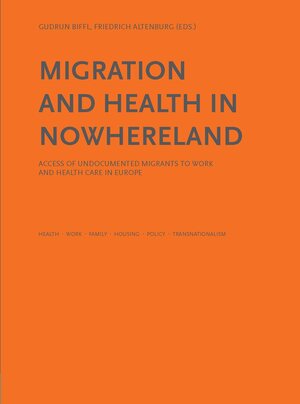
×
![Buchcover ISBN 9783990310007]()
Experts who go in for the following topics: migration, integration, migrants, undocumented migrants, sans papiers, health care issues, HIV, labour markets, transnationlism, families, women, European Union, EU, Nowhereland, communities.
Scientists, students, researchers, participants in university training courses, integration commissioners and organisations, policy advisors, diversity commissioners, university libraries, public institutions, subject specialists in public service, consultants, politicians, EU lobbyists, health organizations, policy advisors, NGOs, hospitals, futurologists.
Migration and Health in Nowhereland - Access of Undocumented Migrants to Work and Health Care in Europe
Health - Work - Familiy - Housing - Policy - Transnationalism
von Gudrun Biffl, Friedrich Altenburg und Carin Björngren-Cuadra, herausgegeben von Gudrun Biffl und Friedrich AltenburgAuszug
EXECUTIVE SUMMARY[excerpt]. In this book we do not only wish to draw attention to the need of improving health protection for irregular migrants for their own sake, but also for the sake of the public health of the community in general. Thus, the aim of the book is to inform policymakers, practitioners and researchers about the multi-faceted state of undocumented migrants in order to speed up appropriate legislative and institutional reforms to deal with their needs.
Currently, some 32 million foreign citizens reside in the European Union, of whom some 1.9 to 3.8 million are undocumented migrants. The most important pull factors are prospects of work, family reunion and chain migration. This explains the increasing difficulty for EU-MS to control migration flows, as human rights regulations protect the right to family. In addition, the right to refuge continues to be a strong element justifying immigration to Europe. The countries of origin of irregular migrants tend to be the same as those of regular migrants; they also tend to follow the same routes, using transnational community networks. Moreover, the changing pattern of origin countries of asylum seekers increases the ethnic and cultural diversity of this group of migrants.
We also draw attention to the increasing inequality in health outcomes, measured by life expectancy, mortality, morbidity and self-assessed health in the European Union. This is not the consequence of a deterioration in the performance of health systems generally, but rather of the increasing disparity in socio-economic status and the widening of the social hierarchy in the various EU Member States. In general, people – especially males – in Central and Eastern Europe live shorter lives and spend more years of their lives in ill health. Southern European countries tend to have large health inequalities by educational attainment level, while countries like France, Germany and Austria tend to have the smallest ones. The Scandinavian welfare model, in contrast, has higher educational health inequality than the Anglo-Saxon model countries, except for Sweden, where differences are quite small. Health risks vary across occupational tasks and industries, accounting for different accident rates and health problems of certain occupational groups of workers. In some of the more risky jobs, migrant workers tend to be overrepresented, contributing to their higher morbidity and accident rates. Irregular migrants, particularly those with traumatic experiences in the source countries and along the migration route, tend to have a high incidence of mental health problems.
Furthermore, a chapter in the book takes a „rights“ approach in characterising the various EU-MS by the access rights of irregular migrants to health systems, differentiating between three categories – those granting minimum rights, those granting less than minimum rights, and those granting more than minimum rights to undocumented migrants. The resulting landscape of wide differences between countries on the right to access health services, cutting across different welfare and migration models, allows no sweeping generalisations.
The book also gives an overview of service providers to irregular migrants, both public and private non-profit sectors. Noteworthy is the prominent role of NGOs, some of them working with a large proportion of volunteers.
In the third section of the book we offer insight into some examples of good practice, covering public institutions, private non-profit organisations and surgeries of GPs and NGOs in different EU Member States. The important distinctions between parallel and complementary approaches between them are documented, with implications for the target groups.
To complement the picture, we give voice to irregular migrants. Living and working conditions in the informal sector and their migration history have a big impact on their health status. Mental health and the sexual and reproductive health problems of women stand out as major problems. This is a burning issue in countries which grant less than minimum rights of access to health services. Reference is also made to the impact of restrictive health access policies on the health of children born into this irregular migrant situation. The interviews identify not only the challenges to the lives of irregular migrants, but also to their survival strategies and the important role of their migrant communities in providing support.
In summing up, the book offers some recommendations which might improve the access of irregular migrants to health services, the most important ones being to raise awareness of the plight of irregular migrants not only amongst the general public and politicians, but also in the communities of the source countries. The second recommendation refers to. [end of excerpt]


